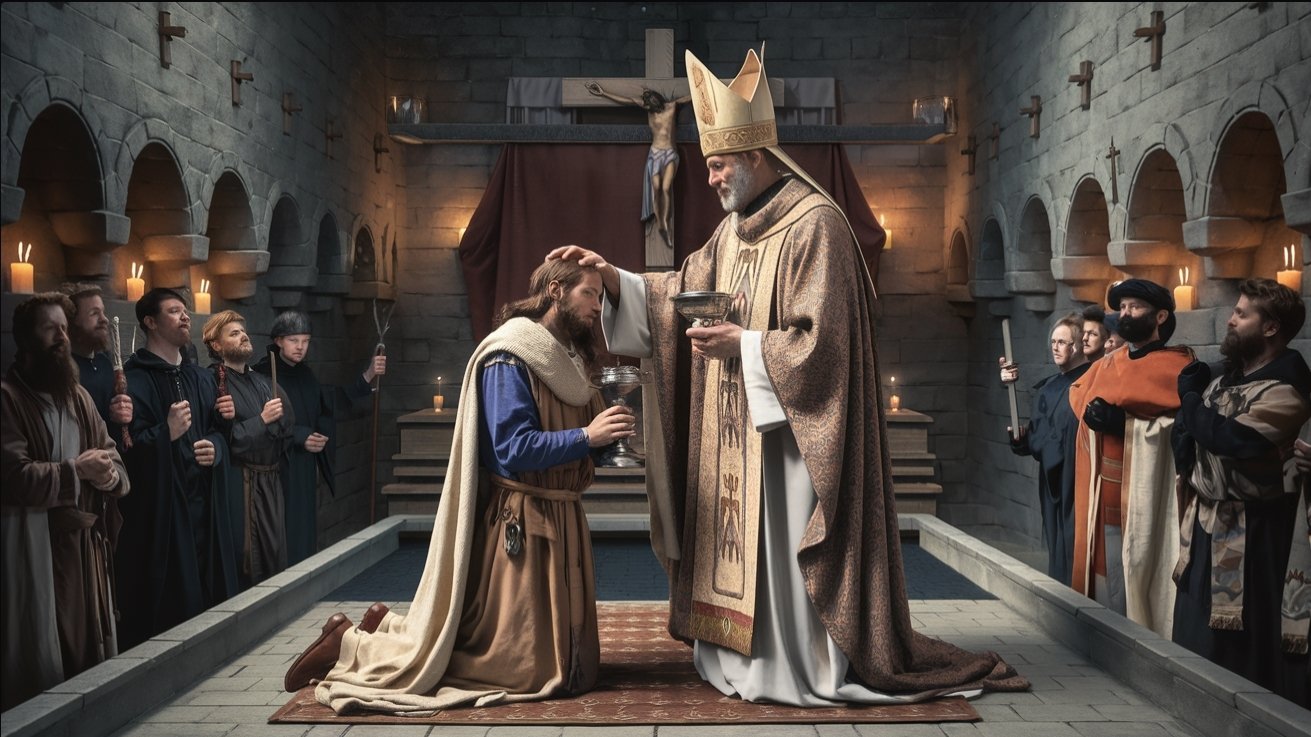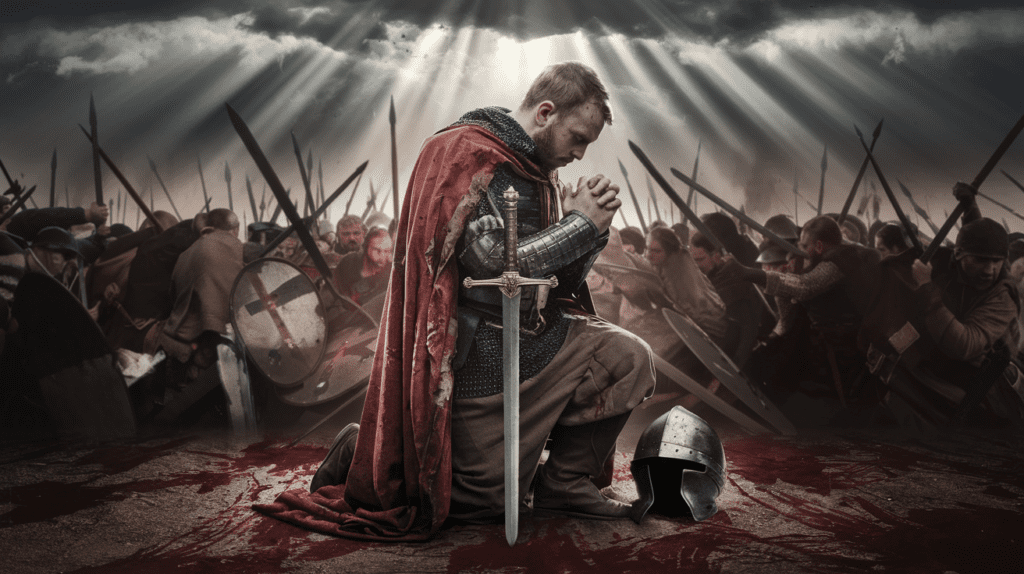
Introduction
Clovis I, also known as Chlodovech, was a pivotal figure in the history of Europe. Born around 466 AD, he became the first king of the Franks to unite all the Frankish tribes under one ruler, transforming the fragmented tribal confederation into a powerful kingdom. His reign marked the beginning of the Merovingian dynasty, which would rule the Frankish kingdom for nearly three centuries. Clovis’s legacy is not only significant for his military conquests but also for his conversion to Christianity, which had profound implications for the future of Europe.

Early Life and Rise to Power
Clovis was born into the Merovingian dynasty, a family of Frankish chieftains. His father, Childeric I, was the king of the Salian Franks, a subgroup of the Frankish tribes. Upon Childeric’s death in 481 AD, Clovis, at the age of 15, ascended to the throne. Despite his youth, Clovis quickly demonstrated his military prowess and strategic acumen.
Clovis’s most significant achievement was the unification of the Frankish tribes. Before his reign, the Franks were divided into several tribes, each ruled by its own chieftain. This fragmentation made them vulnerable to external threats and internal conflicts. Clovis recognized that a united Frankish kingdom would be stronger and more resilient against external invaders.
Through a combination of diplomacy, marriage alliances, and military campaigns, Clovis gradually brought the various Frankish tribes under his control. His marriage to Clotilde, a Burgundian princess, was particularly significant. Clotilde was a devout Christian, and her influence would later play a crucial role in Clovis’s conversion to Christianity.
Clovis’s conversion had far-reaching consequences. It marked the beginning of the Christianization of the Frankish kingdom and established a close alliance between the Frankish monarchy and the Roman Catholic Church. This alliance would become a cornerstone of medieval European politics and culture. Clovis’s baptism also set a precedent for future Frankish kings, who would continue to support and promote Christianity.
The Military Campaigns of Clovis, King of the Franks
Clovis I, the first king to unite all the Frankish tribes under one ruler, is a pivotal figure in European history. His military campaigns not only expanded his kingdom but also laid the foundation for the future of medieval Europe. Here’s a closer look at some of his most significant military endeavors.

The Battle of Soissons (486 AD)
In the final collapse of the Western Roman Empire between 476 and 480, Syagrius was the only remaining representative of Roman rule in the area between the Loire and the Somme. Syagrius ruled an area roughly the size of the Franks, although the latter was split into many minor kingdoms. Nonetheless, in 486 AD, Clovis led his forces against the Roman Domain of Soissons.
The ensuing battle was a decisive victory for Clovis and his Franks. Syagrius fled to the Visigoths (under Alaric II), but Clovis threatened war and the Visigoths handed Syagrius over for execution. This battle was crucial as it marked the end of Roman rule in Gaul and the beginning of Frankish dominance. Clovis’s victory at Soissons allowed him to consolidate power and expand his territory significantly. Consequently, the realm of the Franks almost doubled in size; its border was now on the Loire adjacent to the realm of the Visigoths
Conquest of the Alemanni (496 AD)
In 496 AD, Clovis turned his attention to the Alemanni, a Germanic tribe that posed a threat to his kingdom. The decisive battle took place at Tolbiac, where Clovis’s forces faced the Alemanni in a fierce confrontation. According to legend, Clovis prayed to the Christian God for victory when defeat looked likely, promising to convert to Christianity if he won. When the tide of battle turned in his favor, Clovis kept his promise and was baptized by Saint Remigius, the Bishop of Reims. Clovis’ conversion to Christianity helped ease the acceptance of his rule by the Romano-Gaul populations of the various kingdoms he went on to conquer.

The Burgundian Campaign (500AD)
Around 500 CE, Clovis launched a campaign against the Burgundians, another Germanic kingdom in southeastern Gaul. This conflict was complex, involving shifting alliances and multiple engagements.
Initially, Clovis allied with the Burgundian king Gundobad against the latter’s brother, Godegisel. However, after helping Gundobad defeat Godegisel, Clovis turned against his former ally. The campaign against Burgundy was not a complete conquest but resulted in the Burgundians becoming tributaries to the Franks.
Campaigns Against the Visigoths (507 AD)
Perhaps Clovis’s most significant military campaign was against the Visigothic kingdom of Aquitania in southwestern Gaul. This war, which began in 507 CE, would dramatically alter the balance of power in Western Europe.
The campaign opened with Clovis marching his army through Tours, where he reportedly showed great respect to the shrine of St. Martin, forbidding his men from looting the area. This act, whether genuine piety or clever politics, helped cement Clovis’s image as a Christian king.
The decisive engagement of this war was the Battle of Vouillé in 507 CE. Clovis’s forces met the Visigothic army led by King Alaric II near Poitiers. In a fierce battle, the Franks emerged victorious, and Alaric II was killed.
Following this victory, Clovis captured Bordeaux and spent the winter there. When the campaign season resumed, he consolidated his gains by capturing Toulouse, the Visigothic capital, along with its royal treasury. The campaign concluded with the capture of Angoulême.
The Visigothic War was a resounding success for Clovis. It resulted in the Franks gaining control over nearly all of Aquitania, driving the Visigoths over the Pyrenees into Spain. Only the intervention of Theodoric the Great, king of the Ostrogoths, prevented Clovis from completely annihilating Visigothic power and capturing a Mediterranean port
Consolidation of Power
Beyond these major battles, Clovis also engaged in numerous smaller campaigns to consolidate his power and secure his borders. He subdued various semi-independent local chieftains and integrated their territories into his growing kingdom. His military prowess, strategic acumen, including his conversion to Christianity, allowed him to create a unified Frankish state, which would become the foundation for the future Carolingian Empire.

Legacy of Clovis’s Military Campaigns
Clovis’s military campaigns were instrumental in shaping the political landscape of medieval Europe. His victories not only expanded his kingdom but also facilitated the spread of Christianity among the Franks. By uniting the Frankish tribes and establishing a strong, centralized kingdom, Clovis set the stage for the future successes of his descendants, including Charlemagne.
Clovis’s legacy as a military leader and unifier of the Franks remains a significant chapter in the history of Europe. His campaigns demonstrated his tactical brilliance and his ability to leverage both military might and political strategy to achieve his goals.




